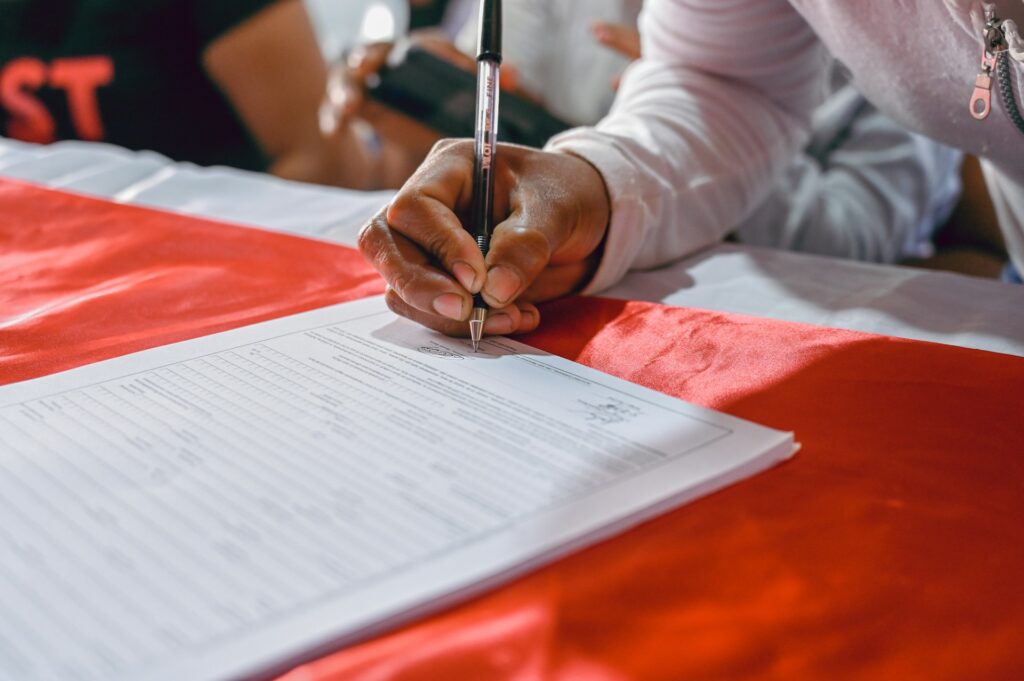Let’s be honest: legal documents and terminology can feel like trying to decipher another language. Power of attorney? Durable, springing, limited, general? It’s enough to make most people’s head spin.
At Mobile Notary Orlando, we know how understanding the power of attorney, especially as a foreigner, can be daunting, but fear not! We’re here to shed light on this essential document and provide clear and concise information.
This quick guide will take you through what is power of attorney, the key terminology, its main types, and an overview of its creation process, arming you with the knowledge to make informed decisions!
What is power of attorney?
A power of attorney is a legal document that lets you choose someone to make decisions on your behalf. Think of it like giving someone you trust a special permission slip to handle your affairs.
This person you select is called your “agent” or “attorney-in-fact.” They can step in and manage specific aspects of your life, like your finances, property, medical decisions, or other important matters.
There are a few reasons why you might want a power of attorney. Perhaps you’re planning a long trip abroad and need someone to manage bills or sign documents while you’re gone. Or maybe you have a health condition and want to make sure someone you trust can make medical choices on your behalf if you’re unable to do so yourself.

It’s important to understand that power of attorney documents can be quite specific. You can give your agent broad authority to handle many areas of your life, or you can limit their responsibilities to just a few things. Additionally, in some cases, a power of attorney goes into effect immediately, while others are designed to “spring” into action if you become mentally or physically unable to manage things yourself.
Choosing someone for this role is a big decision, so take your time. It should be someone you completely trust to make choices according to your wishes. Laws about power-of-attorney documents can vary slightly from state to state, so it’s worth checking your local regulations to ensure you understand all the details.
Key terms you should know
A power of attorney (POA) revolves around key individuals and terms:
- Principal: the person granting the POA, delegating the authority to make decisions on their behalf to someone else;
- Agent (attorney-in-fact): the trusted individual empowered to act on the principal’s behalf;
- Estate: the principal’s assets, including real estate and personal belongings, potentially impacted by the POA’s scope;
- Grant of authority: the specific powers entrusted to the agent as outlined in the document;
- Execution: the formal signing of the POA by the principal, witnessed by impartial individuals. In other words, this makes the POA a legally binding document.
What are the 4 types of power of attorney?
Power of attorney documents come in various forms, each offering specific levels of control and catering to different situations. Let’s take a look at the four main types of power of attorney:
- General Power of Attorney: this grants your agent broad authority to handle a wide range of your personal and financial matters. This could include managing your bank accounts, paying bills, selling property, or making investment decisions on your behalf. However, due to its broad scope, it’s crucial to choose someone you trust implicitly when issuing a general power of attorney;
- Limited Power of Attorney: as the name suggests, this type limits your agent’s authority to specific tasks or situations. For example, you could grant them the power to sell a particular piece of property, manage a specific investment account, or handle legal matters related to a particular case. This option offers granular control compared to a general power of attorney and can be tailored to specific needs;
- Durable Power of Attorney: this type remains valid even if you become incapacitated due to illness, injury, or other reasons. This is crucial for ensuring your agent can continue making decisions on your behalf when you’re unable to do so yourself. Without a durable power of attorney, the document becomes invalid upon your incapacitation, potentially creating challenges in managing your affairs;
- Springing Power of Attorney: unlike other types that take effect immediately, a springing power of attorney only comes into play upon the occurrence of a specific event outlined in the document. This event could be your incapacitation, reaching a certain age, or another specific trigger point. This option allows you to designate someone to manage your affairs only when truly needed, offering flexibility and control over the activation of the power of attorney.
Creating a power of attorney
While a power of attorney grants significant authority and may seem complex, the process of creating one is generally straightforward. Here’s a breakdown of the key steps involved:
1. Choose your agent wisely
This is arguably the most crucial step. Select someone you trust completely, someone who understands your values and financial situation, and someone with the competence and responsibility to handle your affairs. Consider factors like their attention to detail, availability, and assertiveness as well.

2. Determine the type of power of attorney
As discussed earlier, different types of POAs exist for various situations. Choose the one that best suits your needs.
3. Obtain the appropriate form
Most states provide standard power of attorney forms. These can often be downloaded from government websites or obtained from legal aid organizations. Alternatively, consulting with an attorney allows them to draft a customized POA tailored to your specific needs and applicable state laws.
4. Complete the form accurately
Carefully fill out the form, ensuring all information is correct and complete. This includes your details, your agent’s details, the type of POA chosen, and the scope of your agent’s authority. Consider seeking legal guidance if you have any uncertainties or require assistance with the form.
5. Witnessing and signing
In most states, your signature on the POA needs to be witnessed by two credible and impartial individuals (not your agent or family members). Florida is one such exception: POA documents require two witnesses and a notary to be present. And so is Utah, which only requires a single witness.
These people must be present when you sign the document and sign themselves, confirming they observed you signing willingly
6. Notarization
While not always mandatory, some states require or recommend notarization of your power of attorney. This adds a layer of verification and may be helpful for ensuring the document’s validity in certain situations.
Consult with your local authorities or an attorney to determine if notarization is necessary in your case – but trust us when we say it’s ALWAYS a good idea.

7. Safekeeping and distribution
Once completed, keep the original copy of your POA in a secure location accessible to your agent when needed. Consider providing copies to relevant institutions (e.g., banks and investment firms) to facilitate your agent’s ability to handle your affairs smoothly.
Important note: this is a general overview, and specific procedures may vary depending on your state's regulations. Consulting with an attorney can ensure you create a valid and effective power of attorney tailored to your unique needs and circumstances.
Now you know what is power of attorney!
In conclusion, a power of attorney is a crucial legal document that allows you to designate someone you trust to make decisions on your behalf. Whether it’s managing finances, property, or medical decisions, a power of attorney provides peace of mind knowing your affairs are in capable hands.
Remember to carefully choose your agent, understand the different types of power of attorney, and follow the legal procedures involved in creating the document.
If you’re considering a power of attorney or require quick and convenient notarization services around Orlando and Central Florida (Orange, Seminole, Osceola, and Brevard counties), contact Mobile Notary Orlando for professional assistance!
Our team is here to help you go through the process with ease and efficiency, ensuring there are no loose ends and that all documents are properly notarized. Schedule an appointment with us now and we’ll be there for you!






